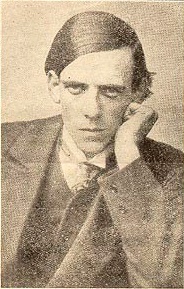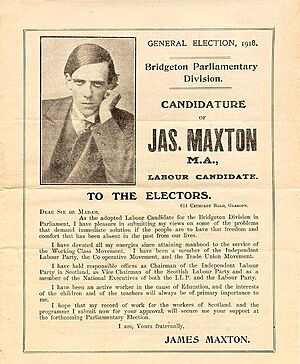James Maxton facts for kids
Quick facts for kids
James Maxton
|
|
|---|---|
 |
|
| Member of Parliament for Glasgow Bridgeton |
|
| In office 15 November 1922 – 23 July 1946 |
|
| Preceded by | Alexander MacCallum Scott |
| Succeeded by | James Carmichael |
| Personal details | |
| Born | 22 June 1885 Pollokshaws, Glasgow, Scotland |
| Died | 23 July 1946 (aged 61) Largs, Ayrshire, Scotland |
| Cause of death | Cancer |
| Political party | Labour (until 1932) ILP (1932–1946) |
| Spouses |
Sarah McCallum
(m. 1919; died 1922)Madeline Glasier
(m. 1935) |
| Children | James |
James Maxton (born June 22, 1885 – died July 23, 1946) was an important Scottish politician. He was known for his strong left-wing views. He led the Independent Labour Party (ILP).
Maxton was a pacifist, meaning he believed all wars were wrong. He spoke out against both World War I and World War II. He also strongly supported Home Rule for Scotland. This meant Scotland would have more control over its own laws. He was a key figure in the "Red Clydeside" movement. This was a time when workers in Glasgow, Scotland, fought for better rights.
He disagreed with Ramsay MacDonald, who was the Labour Prime Minister. Maxton became a strong critic of MacDonald's government. In 1932, he led the ILP to break away from the main Labour Party. After this, he continued to be an independent voice in politics.
Contents
Biography of James Maxton
James Maxton's Early Life
James Maxton was born in 1885 in Pollokshaws. This town is now part of Glasgow, Scotland. His parents were both schoolteachers. James followed in their footsteps and became a teacher too. He studied at Hutchesons' Grammar School and the University of Glasgow.
While at university, Maxton first supported the Conservative Party. But soon, he became interested in socialism. Socialism is a political idea that focuses on fairness and equality for everyone. In 1904, he joined the Independent Labour Party (ILP). This party worked to improve the lives of working people.
A fellow student, John Maclean, greatly influenced Maxton's move to socialism. Maxton also attended a meeting where party leader Philip Snowden spoke. He also read books by writers like Robert Blatchford.
Maxton later said that seeing the extreme poverty of the children he taught made him a socialist. He even convinced his brothers and sisters to join the ILP. His sister, Annie Maxton, became a well-known member of the group. From 1906 to 1910, Maxton was active in the Schoolmasters' Union. Here, he became very good at speaking and writing to persuade people.
James Maxton's Family Life
On July 24, 1919, James Maxton married Sarah McCallum, who was also a teacher. They had one son, named James, in 1921. Sadly, Sarah passed away in 1922.
Later, on March 14, 1935, Maxton married Madeline Grace Glasier. Madeline had worked with him for many years as a volunteer researcher and secretary.
James Maxton's Political Career
James Maxton was famous for being a powerful public speaker. People remembered his thin face and long black hair. He was a very smart person, but his showman style sometimes hid his deep thinking.
Maxton strongly opposed World War I. He was a conscientious objector. This means he refused to join the army because of his beliefs. Instead, he worked on barges. During this time, he helped organize strikes in shipyards. In 1916, he was arrested for speaking out against the war. He was found guilty and spent a year in prison.
In 1918, Maxton was elected to the Labour Party's National Council. He helped push for Labour members to leave the government's wartime team. He also strongly supported Scottish Home Rule. For a while, he was the President of the Scottish Home Rule Association.
Maxton first tried to become a Member of Parliament (MP) in 1918 but did not win.
Becoming a Member of Parliament
In 1922, Maxton successfully became an MP for Glasgow Bridgeton. Once in Parliament, his strong opinions often caused arguments. In 1923, he was temporarily suspended from Parliament. This happened after he called a Conservative MP a "murderer." He said this because the government stopped giving milk to schoolchildren.
In 1933, when Prime Minister MacDonald gave a confusing speech, Maxton famously called out, "Sit down, man, you're a bloody tragedy."
Maxton led the ILP from 1926 to 1931, and again from 1934 to 1939. He was seen as the main symbol of the ILP after it left the Labour Party in 1932. He was a very strong socialist. He was upset when the main trade unions seemed to give up on fighting for workers' rights after the 1926 General Strike.
He wrote the "Cook-Maxton Manifesto" in 1928 with A. J. Cook, a miners' leader. This paper called for a strong fight against capitalism. As ILP chairman, he pushed for a "Living Wages" policy. This demanded high minimum wages for all workers. It also called for the government to take over any private businesses that could not pay these wages.
In 1927, Maxton was chosen to lead the League against Imperialism internationally. He was re-elected to this role in 1929.
Maxton's Views and Actions
In 1932, Maxton wrote a book about the Russian leader V. I. Lenin. Maxton wrote that Lenin was a quiet and humble man. He said Lenin set himself a huge task and stuck to it until the end.
In 1936, after King Edward VIII gave up his throne, Maxton suggested a "republican amendment." This would have changed the UK from a monarchy (ruled by a king or queen) to a republic (ruled by elected officials). Maxton believed the monarchy had "outlived its usefulness." But his idea was defeated by a huge number of votes.
When World War II began in 1939, Maxton spoke out against it. He said, "Don't let's talk of national honour: what do such phrases mean? The plain fact is that war means the slaughter of millions." He urged the Prime Minister to keep the peace.
During the war, Maxton visited Oswald Mosley, the leader of the British Union of Fascists. Mosley was being held in prison at the time.
On January 29, 1942, Maxton was the only MP out of 465 to vote against supporting Winston Churchill's wartime government. This showed his strong independent views.
James Maxton's Death and Lasting Impact
James Maxton died from cancer in Largs, Scotland, in 1946. He was still an MP for Bridgeton at the time. After his death, the ILP struggled and eventually stopped being a major political party.
Many people thought Maxton was one of the best speakers of his time. Even Winston Churchill, who had very different political ideas, called him "the greatest parliamentarian of his day." Historian Graham Walker said Maxton was one of the most interesting people in British public life in the 1900s. He was seen as a hero by many socialists.
Maxton had a big influence on his family. His mother and all his brothers and sisters joined the ILP. His brother John also refused to fight in World War I. His son James and his nephew John Maxton also refused to join the army after World War II. John Maxton later became a Labour MP from 1979 to 2001.
Gordon Brown, who later became the Prime Minister of the United Kingdom, wrote a book about James Maxton.
Publications by James Maxton
- A Living Wage for All: Dr. Salter's Speech in the House of Commons on Wednesday, March 7, 1923. London: Bermondsey Independent Labour Party, 1923.
- The Left Wing: Its Programme and Activities. London: National Left Wing Provisional Committee, n.d. [c. 1926].
- Twenty Points for Socialism. London: ILP Publication Department, n.d. [c. 1927].
- Our Case for a Socialist Revival. With A.J. Cook. London : Workers' Publications, n.d. [c. 1928].
- The Roads to Socialism: Chairman's Address at the ILP Conference. London: ILP Publication Department, 1929.
- The Case of Benn v. Maxton: Being a Correspondence on Capitalism and Socialism, to which is Appended the Report of a Broadcast Debate. With Ernest John Pickstone Benn. London: E. Benn, 1929.
- Speech on the Government's Unemployment Proposals in the House of Commons 4 November 1929. London: ILP Publication Department, n.d. [1929].
- Where the ILP Stands: Presidential Address of J. Maxton to the ILP Conference, together with the Declaration on the Relation of the ILP to the Labour Party. London: ILP Publication Department, 1930.
- Lenin. New York: D. Appleton & Co., 1932.
- Widespread Poverty: "The Existing Social Order Must Go." London: Independent Labour Party, 1933.
- A Clear Lead. With Fenner Brockway. London: Independent Labour Party, 1933.
- Keir Hardie: Prophet and Pioneer. London: F. Johnson, n.d. [c. 1933].
- Dictators and Dictatorship. London: Independent Labour Party, n.d. [c. 1934].
- If I Were Dictator. London: Methuen, 1935.
- The Unity Campaign. With Stafford Cripps and Harry Pollitt. London : National Unity Campaign Committee, 1937.
- Maxton's Great Anti-War Speech. Glasgow : Civic Press, n.d. [1939].
- Why We Oppose Conscription. London: Independent Labour Party, n.d. [1939].
- Break Truce with Tories and Build Labour Unity! A Statement for Consideration by Men and Women of the Labour Movement. With Fenner Brockway. n.c. [London]: Independent Labour Party, n.d. [1943].
 | Selma Burke |
 | Pauline Powell Burns |
 | Frederick J. Brown |
 | Robert Blackburn |


